| |
Taken from ukhh.com (December 03, 2003)
Michael Franti: Growing Old Gracefully?
by Nikesh Shukla
 When I was about 13 years old, I was up watching telly at about 4 in the morning, doing what I shouldn't be. I was watching Planet Pop on ITV and suddenly the screen shook over hysterical static and mesmerising chanting started. I saw a dreadlocked man rap, "Television, the drug of a nation, feeding ignorance and breeding radiation." I nearly wet my pants. Michael Franti was that man. The band was Disposable Heroes of Hip Hoprisy and the industrial punk noises and hardcore rap polemic was an integral part of my growing up, as much a constant to my ears as Public Enemy and KRS-ONE. I loved that raw edgy punk Hip Hop sound. It got me into bands like The Clash and the Dead Kennedys and Fugazi. However, in the late 90s when Michael Franti emerged with his Spearhead project, the complete opposite end of the spectrum, he took a more reggae, funk, polished and positive approach to the music, I felt disappointed. When I was about 13 years old, I was up watching telly at about 4 in the morning, doing what I shouldn't be. I was watching Planet Pop on ITV and suddenly the screen shook over hysterical static and mesmerising chanting started. I saw a dreadlocked man rap, "Television, the drug of a nation, feeding ignorance and breeding radiation." I nearly wet my pants. Michael Franti was that man. The band was Disposable Heroes of Hip Hoprisy and the industrial punk noises and hardcore rap polemic was an integral part of my growing up, as much a constant to my ears as Public Enemy and KRS-ONE. I loved that raw edgy punk Hip Hop sound. It got me into bands like The Clash and the Dead Kennedys and Fugazi. However, in the late 90s when Michael Franti emerged with his Spearhead project, the complete opposite end of the spectrum, he took a more reggae, funk, polished and positive approach to the music, I felt disappointed.
I'm used to my music having darkness, an edge, some danger to it. Instead, he delivered a capable set of clean, funky, summery songs that weren't out of place on Gap in-store CDs. I was surprised at this complete change in direction. But much as I didn't like the music, I was able to appreciate his continued activism and positive political lyrics. I however could not get on board with the happy summery poppy approach he was taking and this upset me. For someone whose career has been so pivotal to conscious rap and to punk energy in the 90s, and someone who I looked up to as a hardcore lyricist, I wondered whether Michael Franti was just mellowing with age.
I met up with Franti backstage at his recent Shepherd's Empire gig as part of an international tour of recent Spearhead album "Everybody Deserves Music." While I waited for him to finish up the interview before me, I was amazed at his grace, poise and general inner peace. A tall man in his late 30s, early 40s, he looked young healthy and happy to answer any question the interviewer from Trouble TV threw at him. I was a little intimidated by his height and his general bonhomie when we finally got to sit down and he seemed generally shocked that I knew about his career and even owned various early albums of his, including the first Beatnigs cut. As we sat and chatted, I felt that perhaps he had grown out of the sound he had honed to perfected on "Hypocrisy is the Greatest Luxury" and as he explained, he needed to keep his music positive, because he just wasn't the same person who began his career, decades ago.
This is what we discussed.
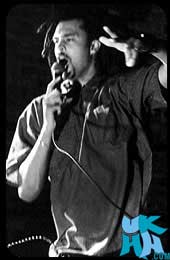 Who are you and what was the last thing you bought? Who are you and what was the last thing you bought?
Well, I'm Michael Franti and the last thing I bought was a newspaper yesterday.
Dr L Shariatri wrote that the four prisons of man are society, history, nature and ego. Discuss:
Society? Ego, history, nature. I would add one more to that, that is the fear of death. Yeah, any of those can be prisons but they can also be liberations. You know. It's up to us, you know, to find acceptance in our hearts for our own sense of who we are and when we find happiness in who we are, we'll be able to see that anything could potentially be a trap or be a joy. Yeah, I mean, umm, you know, the real self is impermanent. I mean the body is impermanent but the real self is lasting, you know. And so when we're able to figure that out and find love for all of our faults and all of our goodness and accept ourselves for who we are then none of those things will, yeah. we can enjoy everything.
Ok, the name of your last album was "everybody deserves music." What does music mean to you:
Well, music is something that is. well in life, we all want to bear fruit, well I want to bear fruit. you know, and the fruits of my life are the destiny, the goals that I have, the vision of what I want to do in my life. In order for any tree to bear fruit, it has to have roots, it has to have soil, it has to have rain and so on, and with the culmination of those things, in time the tree bears fruit. But without one of those things, it's impossible for the tree to bear fruit. And I believe music is one of those elements. Without music, umm, we wouldn't be able to find our own fruition. It doesn't mean that music can change the world overnight. It just means that with the accumulation of all the other things that it can help us to achieve what we want. I also believe that music is a human right, just like a right to clean water and food and a place to live. We all have a right to experience music.
From the Beatnigs to the Disposable Heroes to Spearhead, what does each stage in your career represent to you and how do you quantify each one's impact?
Mmmm, I started off being a poet and that's the one thing that has remained: poetry has always been in my music. But when I started off, I didn't know how to play any instruments nor did the people around me so we just started beating on pieces of metal and adding some percussion and eventually a bass, and just started making this very avant-garde style of political poetry mixed with rhythm. And then with Disposable Heroes, we started to sample those rhythms and then with Spearhead, we said we wanted to just play instruments now. You know, explore through that. And at the same time as all that was happening, Hip Hop was going through an incredible evolution. When I first started making music was in 1986 and first, it was at a time, just before the whole afrocentric movement came into Hip Hop. And by the late eighties if you weren't a political, or if you didn't identify with Africa or identify with culture and roots, you basically weren't relevant at all. So it was like X-Clan, Public Enemy, KRS-ONE, Gang Starr, those are the groups that were making the voice, you know.

"...I've always grown up writing songs and connected politically with people seen as the outsiders..."
And then in the early nineties, in early 93, about the time that NWA first exploded, people saw that you can make a shitload of money doing this time, by talking about stuff that wasn't conscious. And suddenly overnight the music changed. People started saying, "Hey, this is my way out of whatever trap I'm feeling." Economically. For better or for worse?. it just is, you know. I can't really say if it's for better or for worse. It's just the way it is. You could argue that on one hand, the consciousness in the music wasn't there and that affects the way young people live today because they look at the videos and they want what's in the videos and they end up striving for those material things that don't really give us joy. They just feed the corporation. On the other hand, you could argue that Hip Hop has reached more people and more corners of the globe than it ever has before and maybe the videos and the songs and stuff aren't bringing a strong message but. everywhere I see Hip Hop I see graffiti artists, I see breakdancers, I see spoken word poets, I see people who are doing Hip Hop for the love of it on a street level and that's a great thing.
So the original elements are still there if you know where to look?
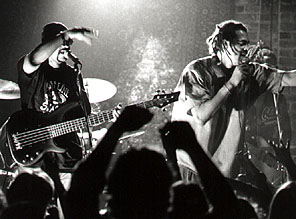 Yeah, yeah. Yeah, yeah.
What would you say is your favourite moment of your career?
You know, I don't.. Say this facetiously at all I would say. everytime I play. Everytime I play, I find something new in it and I learn something new from it. And everytime we hit the stage, it's a different experience for me. There's different highlights you know, we've played in front of huge crowds, we've played in schools, in prisons, we've played in demonstrations, in front of cops and tear gas. But everytime it's the opportunity to play music night after night, that I'm grateful for night after night.
I heard you talking in your previous interview about your prison work, do you see any solution to the current trend of privatising prisons for corporate gain?
Mmmm, well, umm, on an international level, you have corporations like Wackenhut, who are now building prisons all over the world, privately owned and. yeah, refugee centres, prisons in Australia and other places and umm, it's uhhh. it should be banned, internationally banned. Corporations should not be allowed to have their own corporate army. You shouldn't be allowed to incarcerate people as a business. You know, and the reason being, there's no one sentence to let you out of that prison because each day you're in that prison there's a government that's gonna give you money. To house and feed and warehouse them. In America there's a movement called the Restorative Justice Movement, which is about getting prisoners to meet face to face with their victims and have a dialogue. This gets the victims to get into a process of having financial restoration or have a spiritual restoration through dialogue. This is something that's obviously not going to work in every case, especially with violent offenders. but in America, 70% of prison population is there for petty drug offences, which is a victimless crime, it's just the selling of drugs on the street. There's no reason for them to be in there.
Yeah people come out worse than when they go in.
Exactly.
The sound of Disposable Heroes was quite industrial punk and Spearhead is more positive, more funk-based. do you think you're mellowing with age or just getting the funk as you grow older?
Well, I think that, to answer that. when I was doing the Beatnigs and Disposable Heroes, I felt very angry about the world because I felt like I didn't have any power in the world. These days, I'm involved directly, not just speaking out against prisons, I'm inside prisons. I'm putting on demonstrations against the war, I'm working with people on a daily basis in a lot of different organisations who are doing groundwork stuff, so I don't feel powerless anymore. I no longer feel the need to get up there and shout "God, everything's so fucked up, I have this angry, this rage and I don't know what to do with it and I don't know how to let it out." It's like, once you get involved you find that umm it's just, it's not so much about expressing your anger all the time and going to prisons and getting all angry. I go to prisons and I sit down and reason and I go to prisons and I go there to try and bring to joy to the life of people in prison. And there's time to express angry songs. But people are locked up, they wanna let loose. They wanna dance, they wanna have fun. And that's the thing. To be an activist, you don't need a card, you don't need a degree from university. All you need to do is show up and show up the first, second, third time is not that difficult. But to show up two-three years, two-three decades down the line becomes a lot harder. And that's who I make music for. People who need that inspiration.

"...when I was doing the Beatnigs and Disposable Heroes, I felt very angry about the world because I felt like I didn't have any power in the world..."
How did you get into rapping and who are your rapping heroes and who do you check for at the moment?
My rapping heroes are umm, Rakim, Eric B and Rakim, the music and the lyrics, KRS-ONE, a legend, Chuck D of course. These days I really like Jurassic 5, I'm still a huge fan of Freestyle Fellowship, Aceyalone, Blackalicious, all the Quanuum records. umm, Immortal Technique. Those are who I'm really into. But you know, there's a lot of music that I like that's not just Hip Hop. Sometimes you hear a single that's got a hot beat and you're just like, that's cool. But as far as lyrics, I feel there's very few people who are still pushing the envelope as far as lyrics can go. Most artists are just trying to write a hook and fill some time in-between.
What do you think of other spoken word poets who have gotten into rap like Saul Williams and Sage Francis?
Mmmm, yeah, I love Saul. Cos if you ever go and see Saul perform live, there's a rock band or when you see him alone. When you see alone, you see, he's just a supreme intellect, beyond being an artist or a rapper, he's a smart motherfucker, man. And I like being around and listening to smart people, man. Cos I learn a lot. Ursula Rucker, she's just a smart woman. I enjoy being around people who are really intelligent, I just love listening to them.
As the frontman and main lyricist, how involved are you in Spearhead's music making process?
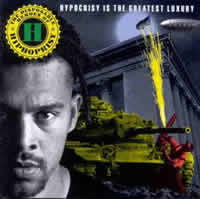 No, well, I'm there one hundred per cent. I produce all the records so I'm in the studio and I play guitar. I come up with ideas on the guitar and flesh it out with the band. No, well, I'm there one hundred per cent. I produce all the records so I'm in the studio and I play guitar. I come up with ideas on the guitar and flesh it out with the band.
Does the band rotate or does it have a set standard line-up?
We have a standard bunch of people. But we're about change keyboardist. He's got a family and it's not working for him to be on the road as much as we are. We change people, but the main core has been the same. The drums, guitar and bass have been the same for a long time.
Your lyrics are more positive and less apocalypitc, yet the world is in a scarier state than it was when you started, how important is it to be positive in your lyrics?
Err, I think that in difficult times, you need something to hold on to. You need to keep your eyes on the prize. And umm, I love Rage Against the Machine. Zack and Tom are my friends from a long time but when I'm down, it's not the music I listen to. I listen to Bob Marley, I listen to Marvin Gaye. Garnett Silk, so that's the music that lifts me up.
Describe your writing process. Do you write to music that already exists or write and then fit it to new beats as they arise?
Yes. I do all those things. It never happens the same way twice. But when I do write a song, I do try and write from the hook of the song first and work my way backwards from there. Cos if you start writing verses and verses and then you're, like, how can I come up with something clever to say? You may never do it, so. but if you can come up with one line like "We can bomb the world to pieces but we can't bomb it to peace." Then I work backwards from there. But sometimes, I'm writing a straight Hip Hop rhyme and you just rhyme to the beat. Sometimes I'm writing a poem and I don't write to any music. Other times, I'm writing a song that's to be sung, so I'm writing with the melody. You start with a verse then a key change for the chorus then another verse then a key change for the chorus, key change for the bridge and then extended outro. follow classic pop song format. Verse, chorus, verse, chorus, bridge, out.

".there were steelworkers, firemen, airline pilots and they were standing next to radical lesbian feminists and people dressed like turtles..."
How did your commitment to human rights arise?
It just started with my birth. When I was born, I was given up for adoption. And I didn't know my birth parents the whole time I was growing, up until I was 22. And I met them. My mother's white and my father's black. And the reason they gave me up for adoption was that my mother thought her family wouldn't accept me. And so, um, as i've grown up, as a kid, I felt like I didn't fit in with the family I was raised with so i've had this affinity with other people who've felt like they were left out. The parents were white but the other kids in the family were black that they also adopted and we all grew up in a very mixed neighbourhood. But, ummm, yes, I didn't feel comfortable growing up in the family I was in. So i've always grown up writing songs and connected politically with people seen as the outsiders. 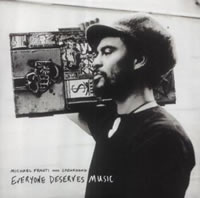
You appeared regularly in anti-WTO documentary "Trade-Off", what are your memories
of being at the Seattle riots.
I don't if i've seen that one. There's several films that were made out of that same time period and I saw a few one of them but I don't know if I saw that one. I can't remember.
It's the one featuring your son and a performance of "Skin Of The Drum" (off Spearhead album "Stay Human").
Ahh, of course, that one yeah. Well, my memories. the main thing is how many different groups of people were there. And if you looked on the news, there were a couple of windows being smashed. But out there, there were steelworkers, firemen, airline pilots and they were standing next to radical lesbian feminists and people dressed like turtles. It was people from all different walks of life, all saying one thing which was "We feel that the human interests, natural and spiritual interests of the world need to take a priority over the corporate, military, materialistic interests of the world." It's as simple as that.
Linking into that, who do you think does worse: the World Bank or the Carlysle Group?
I think they're both equally evil. But they're only as evil as they are greedy. But I don't know how to quantify greed so it's hard for me to say which is more evil. But both businesses are making money for the elite of the world and aren't interested in the human interests of people are they are for the bottom line for their shareholders. And so, I don't if one is worse than the other.
 "...We all have a right to experience music..." "...We all have a right to experience music..."
Who is your favourite writer at the moment?
I don't have a favourite writer or poet at the moment but I read a lot of books, so. right now, I'm reading "The Beloved" by Kaleel Jabraun. Before that, I read the "Alchemist" by Paulo Coelho and I read "Dude Where's my Country" by Michael Moore. As far as Michael Moore goes, umm, I think what he's doing is real great cos what he's doing is waking people up who are sleeping. But in his latest book, his views on Mumia really angered and shocked me. And I was really angry and upset by them. In the book, he says that Mumia is probably guilty and that upset me. Obviously he doesn't know enough about the case to be offering that information off the cuff, in his book. And his books are read by millions of people across the world so I felt it was a very irresponsible thing to do. At the same time, don't throw the baby out with the bath water. At the moment we're doing everything we can to see that Bush gets out of office and so, in that cause, I stand with him. In the cause of Mumia, I don't stand with him.
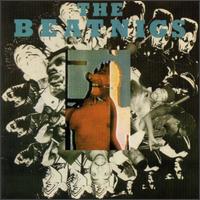 Who are you supporting for the next election? Who are you supporting for the next election?
I'm not supporting anybody till they figure out who's running against him and the person most likely to defeat Bush will get my support. In the meantime, i'll let them fight it out. Cos at the end of the day, none of them really appeal to me that much. I mean, Kosinich seems kinda cool but there's some stuff I disagree with him on. I still have a problem with the fact that it's still all white men running for office. The only people they're considering to be elected. So until that changes, the money that goes into the whole thing changes, it's going to be really hard for me to get behind and support somebody cos we really believe in him.
How do you do stay human?
Through culture. Culture defines our humanity and through our connection to the soul of the world. When we do good things, we add to the soul of the world, when we do bad things, we detract from the soul of the world. So, to try and do good things and show that through our culture.
Any final messages for the UK Hip Hop community?
Yeah, I'm glad to see that UK Hip Hop is thriving and that the community is trying to do its own thing. Cos when I came here in the late 80s there were a few people doing Hip Hop in the U.K., but they were all doing an exact cloning of what they were seeing overseas. And I'm glad today to hear and see people represent where they're from. Cos that's what Hip Hop is about: self-expression. It's not about creation of characters or myths and trying to sell that, it's about trying to express through djing, turntablism, breakdancing, graffiti writing and the spiritual element of Hip Hop, the consciousness, the world connection that we all long for. Stand firm and ummm. just stay human. Respect, brothers.
Respect indeed.
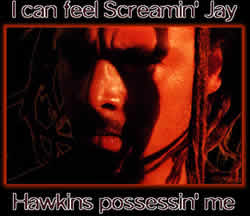 I then file into the concert venue and take my seat to watch Franti onstage bring the Spearhead project to life. And it's everything you would expect, beatboxing, 80s guitars, clean pop rhythms and Franti's unchanged fierce but more melodic voice offering positive messages. The music does not move me but I'm perhaps the only person in the venue who doesn't 'get it'. But as I sit there, I understand that he's changed his style, moved on and now caters for a different audience, an older AOR audience, older than me. The lyrics are still hardcore and the delivery is still great but the audience has changed with Franti's age. I'm not ready to mellow yet, I still want to freak out to dark grimy MF Doom rhythms, whereas Franti's new target audience are more his age, and have mellowed with him. He caters to people who no longer feel the anger and confusion of youth and despair, because with age comes responsibility comes comfort and with comfort comes a greater understanding of inner-peace. As I leave the venue, I understand that Franti really has his head screwed on, and is moving in the right direction. Musically, I may not appreciate this, but he never stopped being a fighter. it's just, the rules are different now. And that's what he's been trying to tell me all along. Wherever you find that vibration and it moves you, cherish it, because in years to come, it'll change and you will change, but that's what makes us stay human. I then file into the concert venue and take my seat to watch Franti onstage bring the Spearhead project to life. And it's everything you would expect, beatboxing, 80s guitars, clean pop rhythms and Franti's unchanged fierce but more melodic voice offering positive messages. The music does not move me but I'm perhaps the only person in the venue who doesn't 'get it'. But as I sit there, I understand that he's changed his style, moved on and now caters for a different audience, an older AOR audience, older than me. The lyrics are still hardcore and the delivery is still great but the audience has changed with Franti's age. I'm not ready to mellow yet, I still want to freak out to dark grimy MF Doom rhythms, whereas Franti's new target audience are more his age, and have mellowed with him. He caters to people who no longer feel the anger and confusion of youth and despair, because with age comes responsibility comes comfort and with comfort comes a greater understanding of inner-peace. As I leave the venue, I understand that Franti really has his head screwed on, and is moving in the right direction. Musically, I may not appreciate this, but he never stopped being a fighter. it's just, the rules are different now. And that's what he's been trying to tell me all along. Wherever you find that vibration and it moves you, cherish it, because in years to come, it'll change and you will change, but that's what makes us stay human.
Respect,
- Nikesh Shukla
|
|